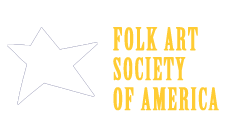[#99] Vol. 29 No. 3 Spring 2020
$10.00
Message from Executive Director
“Andy Dedominici Shares a Spiritual Message with Paint and Thread” by Margaret Day Allen; photographs by Ted Degener
“Power, Myth, and Memory in Africana Art” by Kristin Congdon
“Obsession, Passion, Determination: Cléophas Lachance’s Enormous Endeavor” by Don Hewson
2019 Contributors to Folk Art Society
News and Views
“Mary Michael Shelley: Serving Up a Slice of Everyday Life” by Margaret Day Allen; photographs by Mary Michael Shelley
“An Outsider Art Fair with a Foreign Flavor” by Ann Oppenhimer
“Memory Palaces: Inside the Collection of Audrey B. Heckler” Exhibition review by Carol Millsom
“Exciting Events at Christie’s Outsider Art Auction” by Ann Oppenhimer
“Charlie Thedieck: An Artist Rising” by Beth Wiltshire; photographs by Charlie Thedieck
“November Slotin Auction & The Contemporary Crossover Collector” by Tina Cox
“Letters to the Editor”
“Obituary: Prophet Isaiah Robertson 1947-2020” Photographs and text by Fred Scruton
“Obituary: Mary Ann Carroll 1940-2019” by Gary Monroe
“Obituary: John Henry Toney 1928-2019” by Micki Beth Stiller
Calendar of Exhibitions
Cover Photograph: Prophet Isaiah Robertson by Fred Scruton


